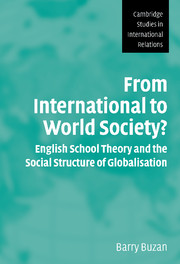 From International to World Society?
From International to World Society? Book contents
- Frontmatter
- Contents
- List of figures and tables
- Preface
- List of abbreviations
- Glossary
- Introduction
- 1 English school theory and its problems: an overview
- 2 World society in English school theory
- 3 Concepts of world society outside English school thinking
- 4 Reimagining the English school's triad
- 5 Reconstructing the pluralist–solidarist debate
- 6 The primary institutions of international society
- 7 Bringing geography back in
- 8 Conclusions: a portrait of contemporary interstate society
- List of references
- Index
- CAMBRIDGE STUDIES IN INTERNATIONAL RELATIONS
3 - Concepts of world society outside English school thinking
Published online by Cambridge University Press: 14 January 2010
- Frontmatter
- Contents
- List of figures and tables
- Preface
- List of abbreviations
- Glossary
- Introduction
- 1 English school theory and its problems: an overview
- 2 World society in English school theory
- 3 Concepts of world society outside English school thinking
- 4 Reimagining the English school's triad
- 5 Reconstructing the pluralist–solidarist debate
- 6 The primary institutions of international society
- 7 Bringing geography back in
- 8 Conclusions: a portrait of contemporary interstate society
- List of references
- Index
- CAMBRIDGE STUDIES IN INTERNATIONAL RELATIONS
Summary
The English school has successfully made the concept of international society its own. Because the meaning of international society (as the society that states form among themselves) is quite specific, there are not many attempts to impart other meanings to the term. The same cannot be said of world society. As shown in chapter 2, the English school's usage of this term is confused, diverse and on the margins of its discourse. In addition, many others have taken up the term, or synonyms for it, as a way of questioning the narrowness inherent in the state-centric quality of international society. World society is used widely to bring non-state actors into the social structure of the international system. This chapter surveys these alternative conceptions with a view to the lessons they offer for thinking about the meaning of world society, and how it should be staged in English school thinking.
There are in practice two broad ways of using the concept of world society. The first, typified by Bull, is to see it as a specialised idea aimed at capturing the non-state dimension of humankind's social order. Buzan and Little (2000), for example, use it as an expression meant to capture either or both of the society (Gesellschaft) or community (Gemeinschaft) aspects of the non-state and individual levels of world politics. In this form, world society is distinct from, and counterpointed to, international society.
- Type
- Chapter
- Information
- From International to World Society?English School Theory and the Social Structure of Globalisation, pp. 63 - 89Publisher: Cambridge University PressPrint publication year: 2004
